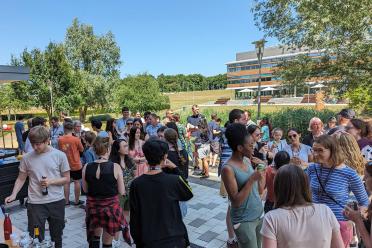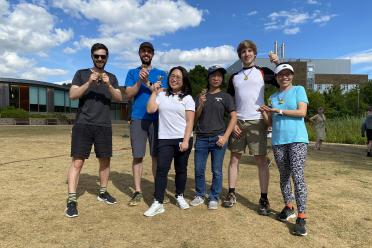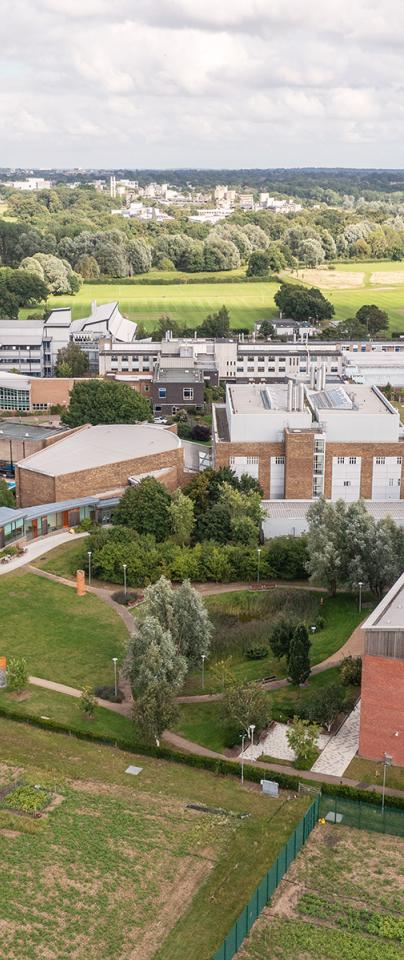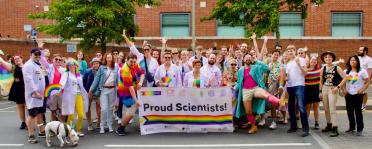Celebrating LGBTQ+ in STEM Day
The 18th November is International Day of LGBTQIA+ People in STEM, highlighting their important and diverse contribution to the fields of science, technology, engineering, and mathematics.
It is a moment to recognise and celebrate each other, while also reflecting on the equality journey and the challenges that remain - some of which may be specific to STEM careers while others are more universal.
Ahead of the day, we spoke to Mariano Olivera Fedi - a bioinformatician and LGBTQ+ Champion on the Earlham Institute’s Inclusivity, Diversity, Equality and Accessibility Committee - about what it means to the community.
Mariano is a bioinformatician working in the Earlham Institute’s Core Bioinformatics Group. His role is divided between developing, maintaining, and updating pipelines used for analysing sequence data.
“My work involves monitoring each step we take to ensure the quality of the data being generated meets the standards set by the scientific community,” Mariano explains.
He’s also involved in the downstream analysis of this data, including the annotation and assembly of genomes. The work of the Core Bioinformatics Group is critical to the success of the Institute’s strategic research programmes.

Mariano studied Biological Sciences at the University of Buenos Aires before completing a Masters in Bioinformatics. He was initially hoping to keep his options open but, with much of his lab work effectively halted during the pandemic, he gradually focused on computational biology.
Post-pandemic, Mariano wanted to leave Argentina to explore. He began looking for jobs in centres of scientific excellence, including roles in the US, UK, and Germany.
“I applied for a few jobs but the bioinformatician position at EI was a really good fit for me,” he explains. “Lots of the things being studied in the group related to things I’d done back in Buenos Aires.”
As a member of the LGBTQ+ community, an important consideration for Mariano was the ability to feel welcome in a new team, organisation, and city.
“One of the big fears I had about moving to a new and smaller city was whether there would be a community for me here, and whether I would be accepted.
“I was actually quite surprised to discover this is a really good spot to be part of the LGBTQ+ community. There’s a big and active community, and people really accept you.


I was actually quite surprised to discover this is a really good spot to be part of the LGBTQ+ community. There’s a big and active community, and people really accept you.

The Earlham Institute is a member of the Diversity Champion programme, run by the global LGBTQ+ rights charity Stonewall, which supports workplaces to be safe and welcoming to all, and where people are free to be themselves.
The programme, along with moments such as International LGBTQ+ people in STEM day, are critical because of the reality of the working world for LGBTQ+ people. Discrimination, negative comments, and the sense of not being able to bring your whole self to work are just some of the experiences they report.
For Mariano, the 18th November is an opportunity for scientific organisations like the Earlham Institute to send a very clear message of welcome and acceptance to the LGBTQ+ community.
“Having a day to celebrate people in science who are part of the LGBTQ+ community will incentivise others to make choices about their careers. These are choices they might not have made for fear of being rejected.”
As well as existing staff or potential job applicants, Mariano also feels moments such as this matter to the next generation of scientists.
“I think it’s extremely important to have role models in life. If young people don’t have an interest in becoming scientists you will never have the representation of those communities. The first thing people need to know is that, if they want to do it, they can do it.”

Mariano is the LGBTQ+ Champion on the Inclusivity, Diversity, Equality and Accessibility Committee (IDEA), which brings together people from across the Earlham Institute to advise on, and assist with, the development and implementation of an organisational IDEA strategy.
“I’m fairly new to the role,” he says, “but what I want to do with this position is give a voice to all the people who are part of the community - or allies - so they feel represented.
“In my experience, members of the LGBTQ+ community tend to hide parts of their personality because they think that it will be detrimental to their careers.
“I want them to feel they don’t have to hide any of their life in the workplace - they should be accepted as they are, and it shouldn’t be something that affects their careers.”
Mariano’s experiences are reflected in the data collected by Stonewall. Over a third of LGBTQ+ people feel they need to hide who they are at work and one in five feel their identity limits their job opportunities.


With the Stonewall programme and the Norwich Bioscience Institutes LGBTQ+ Group, the idea is to bring our minds together to see what each workplace is doing to support the LGBTQ+ community - whether that’s through policies, activities, or other initiatives.

As a bioinformatician, Mariano feels he can apply his scientific skills and expertise in his role on the IDEA Committee to try and change the experiences and perceptions of the LGBTQ+ community at the Institute.
“I really want to start setting some metrics, because my background and expertise is doing that kind of analysis,” he explains.
“I think one of the biggest issues in society is having bad data. Once you have all the right data, you can make sensitive decisions that will really make a difference.
“Sometimes we also impose our assumptions and biases on the data, when really we should let the data speak to us.”

Members of the Norwich Bioscience Institutes (NBI) LGBTQ+ Working Group at Norwich Pride 2023. Image credit: Stephen Bornemann, The Sainsbury Laboratory
As well as his role on the Earlham Institute’s IDEA Committee, Mariano is also part of the Norwich Bioscience Institutes LGBTQ+ Group. This brings together members of the community and allies from across the Norwich Research Park.
“With the Stonewall programme and the Norwich Bioscience Institutes LGBTQ+ Group,” Mariano explains, “the idea is to bring our minds together to see what each workplace is doing to support the LGBTQ+ community - whether that’s through policies, activities, or other initiatives.
“This allows us to create a consensus around best practice. And, if we can’t do everything in each institute, we select the best things to suit our particular workplace ecosystem and monitor the impact.”
It’s fair to say the research and innovation sector suffers from the same biases and stereotypes as any other. But the conversation about these issues - and how we address them - is more advanced than in some industries.
This is thanks to people like Mariano and the various groups that have been established to give the LGBTQ+ community a safe space and a voice through which they can advocate for change.
“We need to have an open mind and accept that we can always improve,” he states. “It’s the same philosophy we have for science in general!
“There are still fights to be fought. For example, seeing greater representation in senior roles across the sector. But I don’t have to fight every day for acceptance or a sense of belonging.”